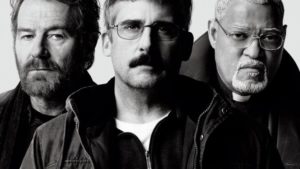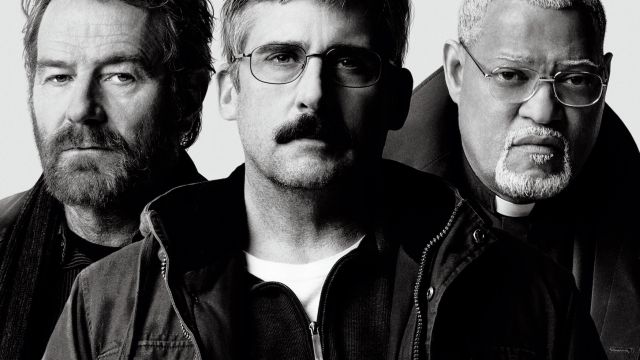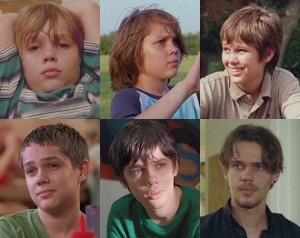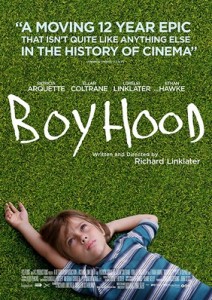Last Flag Flying
Posted on November 9, 2017 at 9:28 pm
B +| Lowest Recommended Age: | Mature High Schooler |
| MPAA Rating: | Rated R for language throughout including some sexual references |
| Profanity: | Very strong and crude language |
| Alcohol/ Drugs: | Drinking and alcohol abuse, smoking, references to drug abuse |
| Violence/ Scariness: | Themes of military service in wartime, sad deaths offscreen |
| Diversity Issues: | Diverse characters |
| Date Released to Theaters: | November 10, 2017 |
| Date Released to DVD: | January 29, 2018 |

Three of the best actors in the world give immense depth and humanity to characters who might so easily have been caricatures in “Last Flag Flying,” about three veterans on a sad personal mission. It’s got a backstory that might be worth a movie of its own. “The Last Detail,” based on the book by Darryl Ponicsan, starred Jack Nicholson and Otis Young as Marines ordered to escort a naive teenaged sailor (Randy Quaid) to serve an eight-year prison sentence for a trivial offense. It was a critical and commercial success due to Nicholson’s performance and a picaresque tone that suited the era. 4 years later, another Ponicsan book about three military men (now long retired from service) on a sad journey with some comic detours comes to the screen, directed by Richard Linklater (“Boyhood”). It is not a sequel, though some of the characters have the same names and some similar histories.
It is 2003. A man carrying a manilla envelope walks into a dodgy little dive bar and orders a beer. The bartender barely glances at him, in the midst of a one-sided conversation with the bar’s only other customer, a regular. “You don’t remember me, do you?” asks the man with the envelope. The bartender, who is also the owner of the bar, takes a good look. “Doc!” he crows. “No one has called me that in years.” Doc is Larry Shepherd (Steve Carell) and the man behind the bar is Sal Nealon (Bryan Cranston). They eat pizza, talk about old times, and fall asleep in a booth. The next day, Larry takes Sal to a church, where the Reverend Richard Mueller (Laurence Fishburne) is conducting services. The men have not seen each other in decades, but they served together in Vietnam, Nealon and Mueller in the Marines and Shepherd in the Navy.
Mueller is not especially happy to see friends from the days when he was known as Mueller the Mauler, but he invites them to dinner at his home with his wife, Ruth (a splendid Deanna Reed-Foster, warm and wise). It is there that Shepherd explains why he wanted to find them. His son has been killed in action and he wants Mueller and Nealon to accompany him to the funeral. Nealon goes because he wants to do something different. Mueller goes, reluctantly, because he wants to be of service. “They represent a dark period in my life,” he tells Ruth, “a very dark period.” “And you represent God,” she replies.
And so the odyssey begins, with many adventures along the way, and, as Linklater does so well (the “Before” trilogy, “Waking Life”), many wide-ranging conversations, here including discussions of the past and present, the newish technology of the cell phone, sex, sleep, race, order, chaos, war, lies, choices, and consequences. Accompanying them for part of the trip is a Marine who was a close friend of Shepherd’s son (J. Quinton Johnson of “Everybody Wants Some!!!” excellent).
Near the end, Linklater gives us two scenes showing that what might have seemed episodic and slight was deliberate, thoughtful, and meaningful. It is his actors’ respect for the flawed characters they play and Linklater’s own respect for their choices, challenges, and regrets, that show us what we ask of the people who go to war on the other side of the planet because someone thought it would keep us safe, and what we owe them as well.
Parents should know that this film includes very strong and crude language, drinking, smoking, references to drug abuse, references to wartime violence, and very crude sexual references including prostitution.
Family discussion: What should they have told Mrs. Hightower? Why did Larry want to bring his son home? Who would you call for a journey like that one?
If you like this, try: “The Last Detail” and “Taking Chance”



